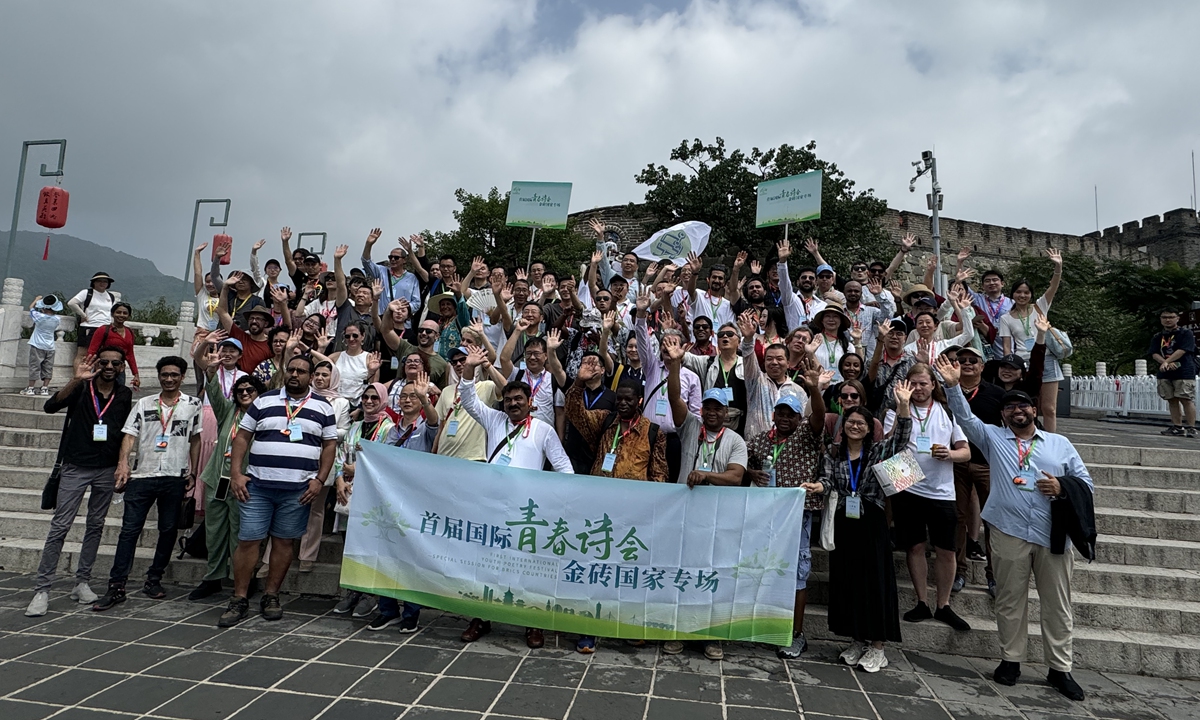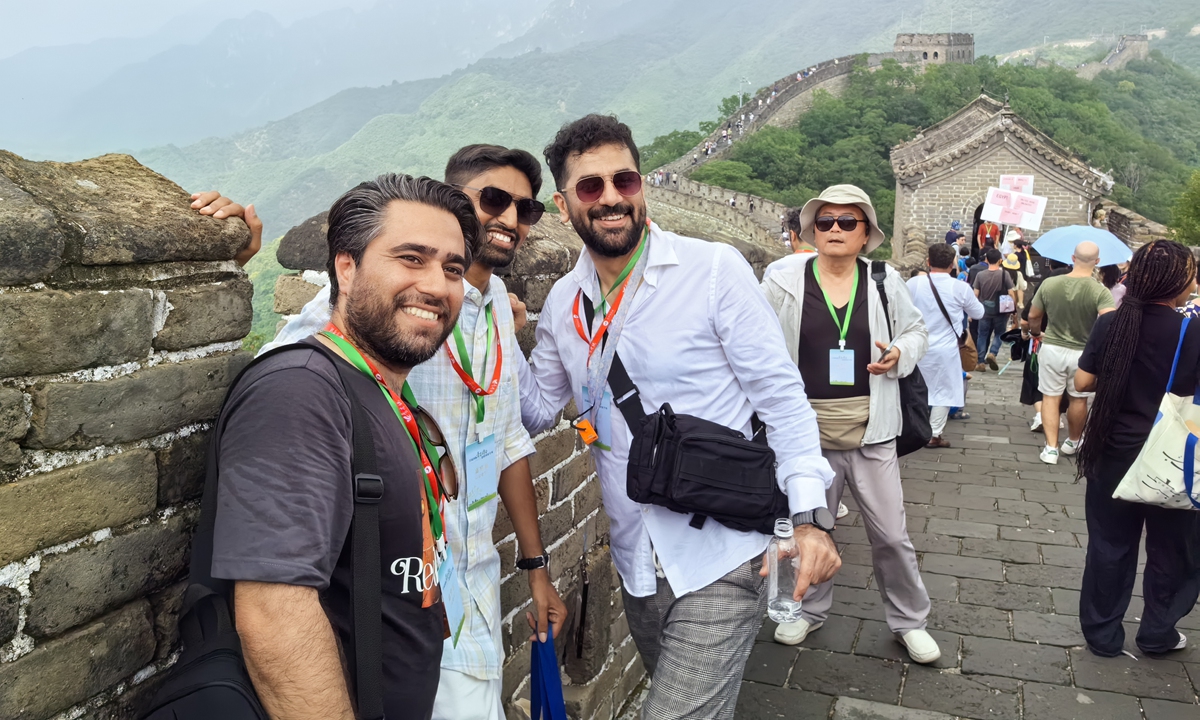
Poets from BRICS countries pose for a group photo at the Mutianyu section of the Great Wall in Beijing on July 23, 2024. Photo: Dong Feng/GT
"On the Great Wall, I met her.
She smiled.
And we walked 20,000 kilometers together."
Kianoosh Khan Mohammadi, an Iranian poet, reads his latest poem written after a tour at a poet sharing session held at the foot of Mutianyu Great Wall, a well-preserved section of the Great Wall of China, built in 1368.
The session was part of the second leg of the First International Youth Poetry Festival: Special Session for BRICS Countries, which was hosted in Beijing on Tuesday.
Seventy-two poets, from countries including India, Russia, Iran, and Brazil, participated in a range of academic seminars, visits to historical sites, and poetry recitals in their native languages at the event with passion, in their own rhythms, and getting to know more about their various styles.
Making friends through poetry
On her way to the Great Wall, Evgeniia Uliankina, a Russian poet, told the Global Times that this is her first time in China, and she was excited to check out the marvelous Great Wall.
More importantly, she finds this trip fairly eye-opening.
"We [poets] are from different countries and speak different languages. Yesterday, on our way from Hangzhou to Beijing, we sang for each other despite language barriers, and we understood each other," she said.
Prithviraj Taur, an Indian poet, said right before his sharing session that he plans to get all 72 poets' works selected and shared at the event translated into Marathi, a language spoken in India, expressing his gratitude to China Writers Association for hosting this special session.
His peer, Gautam Vegda, told the Global Times that during the trip, he has gained a better understanding of a community of shared future for mankind. "We may speak different languages, but we can create works under the same theme, which can be powerful."
At the Great Wall, Enock Shishenge, a poet from South Africa greeted Nikhilesh Mishra, his counterpart from India in a way that expressed great respect for each country's heroes, referring to each other as "Mohandas Karamchand Gandhi" and "Nelson Rolihlahla Mandela."

Foreign poets pose for a photo at the Mutianyu section of the Great Wall in Beijing on July 23, 2024. Photo: Dong Feng/GT
Leaving footprints in words
A century ago, Indian poet and philosopher Rabindranath Tagore made his maiden visit to China, which has been seen as an integral part of the history of China-India friendly exchanges. The legacies of this visit, including a poem presented to Peking Opera master Mei Lanfang by the literary giant for his wonderful performance, still shines after a century.
The poem reads, "You are veiled, my beloved, in a language I do not know. As a hill that appears like a cloud behind its mask of mist."
The sincere words articulate that distinct people from different cultural backgrounds still share the pursuit of exquisite artistic or literary works.
Cut to one century later, the young poets from BRICS countries including India, Russia, and Brazil arrived in China. Even though they used diverse native languages, there were no barriers to prevent them from expressing their deep love for poetry and a desire to befriend their Chinese peers.
"Poetry plays a crucial role in cultural exchanges among BRICS nations," noted Thiago Ponce, a Brazilian poet from Rio de Janeiro.
At the opening ceremony of the event held in Hangzhou, East China's Zhejiang Province, poets from 10 countries poured the "Water of Friendship," a symbol of the Mother River of each country, into a jade container, watering and lighting the "Tree of Friendship" on both sides of the stage.
The 72 poets, 23 from China and 49 from other countries, jointly created a long poem themed "distance cannot keep hearts apart" that was beamed on a screen with all of the poets' names during the opening ceremony. Even after the ceremony ended, the poets did not leave but still recited poems and exchanged ideas at the lobby.
For many of the poets, this trip to China is their first time in the country.
They include university teachers, students, journalists, and doctors. Among them is Shaikha Almteiri, a poet from the United Arab Emirates, who said poets should maintain an open mind, exploring new perspectives and expressions from diverse cultures and lifestyles to stimulate the vitality of poetry.
Zhao Xiaomo, a Chinese poet, told the Global Times that the poets' visit to the Zhejiang Literature Museum was one of the most impressive moments during the Hangzhou tour.
"As an important witness to the cultural exchanges between young Chinese and foreign poets, Lu Zhouhang, a representative of Chinese poets, and Andrei Cherkasov, a representative of poets from other BRICS member countries, jointly donated poetry manuscripts to the Chinese Museum of Modern Literature and the Zhejiang Literature Museum. This means that we will have follow-up work after the event. We eye long-term collaboration," she said.
In Hangzhou, the poets also visited some historical sites and stood beside the spots where many renowned ancient Chinese poets such as Li Bai, Bai Juyi and Liu Zongyuan left their mark in masterpieces. The stories of these Chinese poets passed down from thousands of years ago have inspired foreign poets to make more creations even before returning to their homelands.
Poetry builds a bridge of friendship. These guests will bring these memories and inspirations back to the countries, spreading the spirit of friendship with their words, they said.



